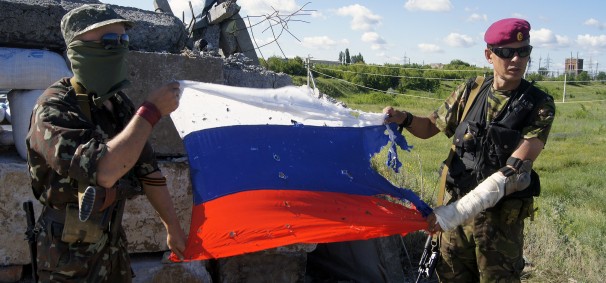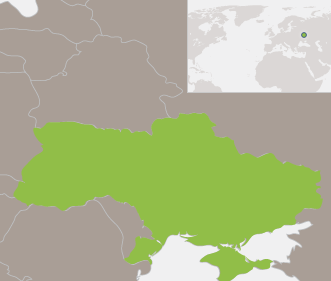The downing of Malaysian Airlines Flight 17 serves as a stark reminder that the crisis in Ukraine has not been resolved, despite the disappearance of the conflict from the mainstream media’s headlines in the weeks prior to the incident.
Political turmoil in Ukraine is nothing new. One only needs to look at the 2004 Orange Revolution, when citizens mobilized throughout the country to protest the blatant election fraud of the November 2004 presidential elections and the pervasive corruption in their government. Yet Ukraine’s political crisis has certainly intensified during the past year, with much broader international implications.
In late 2013, Ukraine was on track to sign an EU-Ukraine Association Agreement; a bilateral agreement between the EU and a non-EU member country that can pave the way for accession into the European Union. The EU-Ukraine Association Agreement included progressive trade liberalization changes, a historic trade deal for Ukraine, and greater mobility for Ukrainian citizens throughout Europe. Yet, in late November 2013, President Viktor Yanukovych suddenly refused to sign this agreement. Citing pressure from Russian President Vladimir Putin, Yanukovych chose to instead build stronger ties with Russia, accepting 15 billion USD in investments and discounts on gas imports.
This unexpected refusal served as the catalyst for the political turmoil to come. Thousands of citizens protested the perceived betrayal by their government, leading to violent clashes between demonstrators and police – and eventually forcing Yanukovych to flee to Russia. Ominously, Russia refused to recognize the new interim government that took power in Kyiv, with Foreign Minister Sergei Lavrov calling what transpired in Ukraine a military coup.
The protests have exacerbated tensions between the ethnic groups in Ukraine. The protest movement was spearheaded in the ethnically Ukrainian urban core of Kyiv, and gradually spread to other large cities in the country’s west. However, Ukraine has a sizable Russian minority (17.3 percent of the total population, according to 2001 census) located primarily in the industrialized east and in the Crimean peninsula, who were largely supportive of Yanukovych’s newfound desire to foster greater integration with their former Soviet compatriots. Parallel protests emerged in cities throughout eastern Ukraine and Crimea, as pro-Russian citizens increasingly took up calls for referendums on independence.
The Autonomous Republic of Crimea, with a population of 60 percent ethnic Russians, was the first part of Ukraine to become a political hot-spot in the crisis. In March 2014, with the help of Russian special forces, Crimean separatists were able to seize power and stage a referendum on secession under Russian annexation, which Western commentators claimed was ‘a sham display of democracy.’ Crimea subsequently declared independence and signed a treaty with Russia incorporating the Republic into the Russian Federation – a move that much of the international community has refused to recognize.
Soon thereafter, eastern Ukraine was quickly engulfed in violence between pro-Russian rebels and Ukrainian security forces keen to prevent a Crimea-type situation from occurring in the country’s east. In May, the republics of Donetsk and Luhansk declared independence following referendums that were also not recognized by Ukraine or the West. Ukraine has classified the newfound Donetsk People’s Republic (DPR) and Luhansk People’s Republic (LPR) as terrorist organizations, and urged both the UN and United States to do the same. In June, the DPR and LPR declared the official union of their republics as the confederal Union of People’s Republics.
Separatist leaders, pro-Russian citizens, and Vladimir Putin himself have referred to the secessionist eastern Ukrainian territory as ‘Novorossiya,’ which was what the area was known as in 18th and 19th century imperial czarist times. Speaking about eastern Ukraine during a televised interview this past April, Putin said: “It’s New Russia. Kharkiv, Luhansk, Donetsk, Odessa were not part of Ukraine in czarist times, they were transferred in 1920. Why? God knows.” By referring to ‘Novorossiya,’ President Putin offers a troubling indication of an irredentist desire to reunify ethnic Russians living outside of Russia with the mother country.
The commander of the DPR rebel forces – or so-called ‘defence minister’ of the self-proclaimed state – is Igor Strelkov, a Russian citizen who gained notoriety for his military service in Chechnya, Transnistria, and Bosnia. Alexander Borodai, also a Russian citizen who served with Strelkov, was named ‘Prime Minister’ of the DPR on May 15. Both of these key figures in the DPR, by virtue of being Russian imports into the conflict in Ukraine, serve as testaments to the inextricable role that Russia is playing in the Ukrainian conflict.
Ukraine’s presidential elections, held in May 2014, saw the overwhelming victory of Petro Poroshenko, who quickly stated that he would ensure the ratification of the EU association agreement that had triggered the current conflict. On June 27, 2014, Poroshenko signed the EU-Ukraine Association Agreement, which is on track for ratification in contingence with further ministerial consultations.
Russian President Vladimir Putin has begrudgingly accepted Poroshenko’s electoral victory. Yet the progress of the association agreement is a serious point of contention for Russia, as it is a concrete signifier of their diminishing influence in Ukraine.
Amid the continuing violence, Putin and Poroshenko have spoken about the possibility of establishing a ceasefire in eastern Ukraine. Poroshenko announced a unilateral ceasefire and a 14 point peace plan that was to last from June 10 to 27. The ‘ceasefire’ did little to quell the violence, however, as it was unilaterally-declared and pro-Russian militants did not agree to it.
The shooting of twelve Ukrainian aircrafts, as well as the recent downing of Malaysian Airlines flight 17, were only possible because pro-Russian separatists have acquired Russian surface-to-air missiles. Ukraine has repeatedly accused Russia of backing the rebels and helping them bring Russian weapons across the border into Ukraine. Further, there is evidence of a significant upsurge in the flow of Russian major weapons to the DPR separatists over the last month, including shipments of rocket launchers and tanks.
U.S. Secretary of State John Kerry has repeatedly called on Russia to do more to put an end to the conflict in Ukraine. Kerry has called upon Putin to cancel the parliamentary authorization for Russian military intervention in Ukraine, urge the pro-Russian rebels to surrender their weapons, and end Moscow’s support for the rebels. Putin, however, remains adamant in his irredentist rhetoric of needing to protect ethnic Russians living in Ukraine.
Still, rebels in eastern Ukraine have shown some level of dissatisfaction on the extent of Russian aid. In a commentary piece on a Russian social media site, Igor Strelkov compared Putin’s support to that of Slobodan Milosevic’s support to Serb rebel groups operating in Bosnia in the early 1990s, stating that ultimately Milosevic was defeated and humiliated because he decided not to “provide full fledged support to the Serbian insurgents.”
The separatists are heavily dependent upon monetary and military support from Russia. To this end, the pro-Russian separatist movement risks imminent failure without such external aid. Ukrainian security forces are encroaching upon the eastern parts of the country, gradually reclaiming separatist strongholds. At this point, separatists have been relegated mainly to the cities of Donetsk and Luhansk.
Ukrainian forces intensified operations after July 17, following the shooting of Malaysian Airlines flight. So too did Russia, amassing thousands of troops along the Russo-Ukrainian border and reportedly shelling Ukrainian military positions from the Russian side of the border. Despite continuing attempts by the international community to isolate Russia via sanctions, Putin has not relented in his support for the rebels. Although Strelkov may be voicing complaints of inadequate assistance from Russia, Putin does not show any signs of backing down from his irredentist support of ethnic Russians living in Ukraine.
Chelsea Winn is a Research and Communications Intern at the Centre for Security Governance.
Tags: Crimea, Eastern Ukraine, MAH17, Russia






 Visit the Centre for
Visit the Centre for